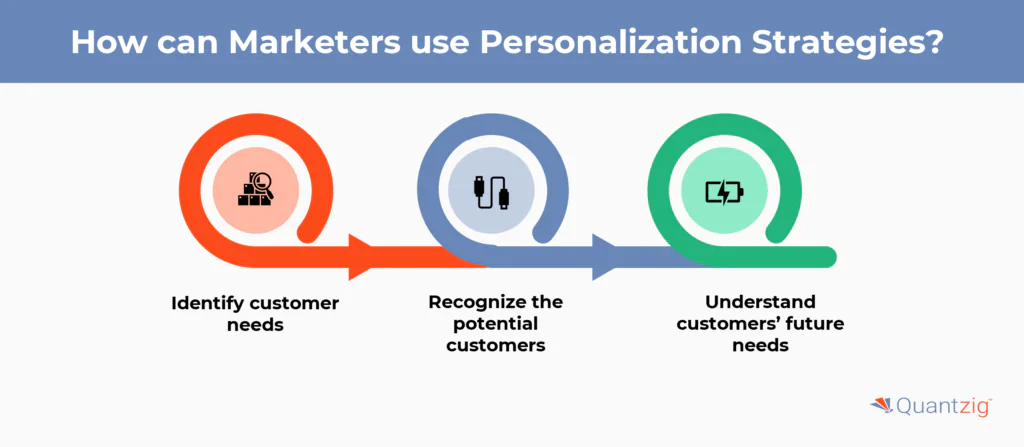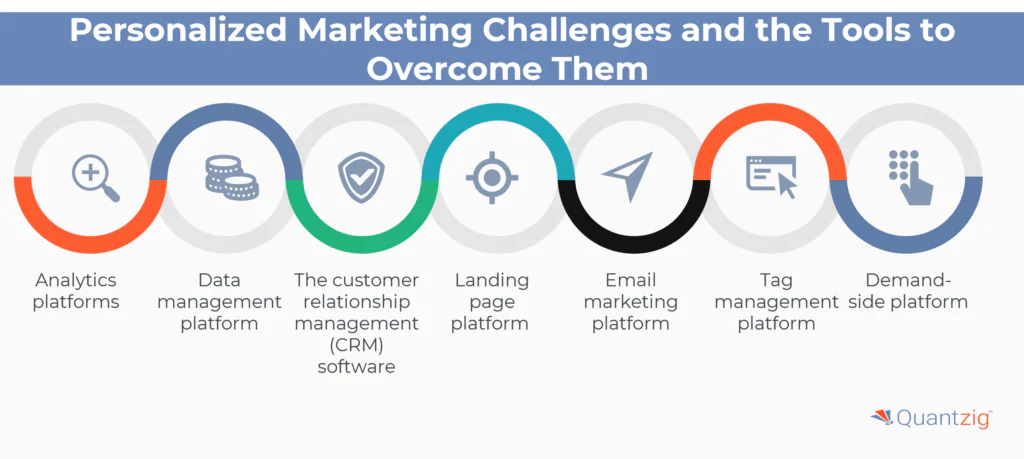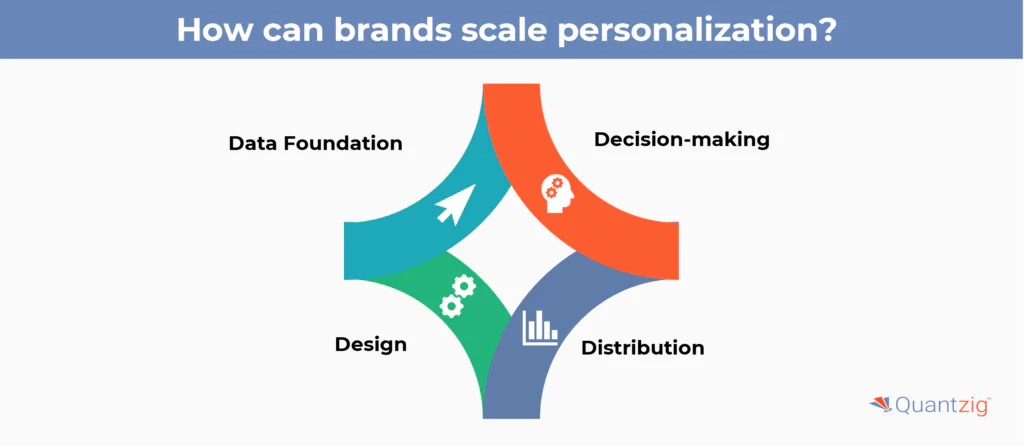Author: Associate Vice President, Analytics and Data Strategy, Quantzig.
Table of Contents
Key Takeaways for Personalization Marketing
- Quantzig’s Integrated Customized Marketing Platform helped a major US retail manufacturer to achieve the RoI from the personalized campaigns increased by 15% as compared to the earlier campaigns.
- Personalized marketing allows brands to create stronger bonds with customers. This leads to higher engagement, loyalty, and business expansion by customizing marketing initiatives to match each person’s tastes and actions.
- Data privacy worries, ensuring data is correct, moral issues, shifting customer wants, and being able to grow the solution to scale are some of the major difficulties with putting in place a personalization system.
- In general, personalized marketing assists in generating a higher return on investment from any marketing initiatives by enabling a deeper understanding of the customer.
- It leads to increased conversion rates, higher engagement with campaigns, improved conversion ratios, and overall greater customer acquisition at a lower cost compared to an impersonal campaign.
Introduction
Nowadays, most customers crave personalized experiences, whether in the form of personalized automation rules customized for specific workflows or abandoned cart emails depending on past purchasing histories. The more personalized experience you offer to your customers, the more value your customers will receive. Marketers skillfully utilize data to craft timely and highly relevant messages for each prospect, focusing to catch their exact interests. In this case study, we’ll cover what exactly personalized marketing is, examples of personalized marketing, and how Quantzig can help you with personalized marketing to increase your conversations with customers.
Book a demo to experience the meaningful insights we derive from data through our analytical tools and platform capabilities. Schedule a demo today!
Request a Free DemoQuantzig’s Personalization Marketing Solution for a Retail Brand
| Client Details | A leading US-based retail manufacturer with a diverse product portfolio. |
| Challenges Faced by The Client | The client lacked a tailored marketing strategy, which resulted in lower returns on their marketing investments in terms of customer conversions, the amount of money spent to acquire each customer, and inconsistent outcomes across marketing campaigns. |
| Solutions Offered by Quantzig | Quantzig developed an Integrated Customized Marketing Platform and evaluated past campaign feedback, conducted surveys to understand consumers more fully, and leveraged those insights to build a tailored marketing system. |
| Impact Delivered | The ROI from the personalized campaigns increased by 15% as compared to the earlier campaigns. It also provided insights on the right channels to target and budget re-allocation based on performance data. |
Client Details
A leading US-based retail manufacturer with a diverse product portfolio.
Challenges in Personalization Marketing Faced by the Client
The client lacked a tailored marketing strategy, which resulted in lower returns on their marketing investments in terms of customer conversions, the amount of money spent to acquire each customer, and inconsistent outcomes across marketing campaigns.
Personalization Marketing Offered by Quantzig for the Client:
Quantzig developed an Integrated Customized Marketing Platform for a major US retail manufacturer. We gathered information on customers including product inclinations, psychographic and demographic data, purchasing patterns and behaviors, approaches to connect with diverse customer types, and other details that offered insights into customer actions and better ways to contact them through our customized content marketing efforts.
We also evaluated past campaign feedback, conducted surveys to understand consumers more fully, and leveraged those insights to build a tailored marketing system that facilitated crafting messages based on user profiles, and provided guidance on optimal timing and channels to reach customers. The platform enabled effectively connecting with consumers in a more personalized manner.
Impact Delivered using Quantzig’s Expertise:
The ROI from the personalized campaigns increased by 15% as compared to the earlier campaigns. It also provided insights on the right channels to target and budget re-allocation based on performance data.
Also Read: Maximizing Marketing Budgets with Campaign ROI Analysis
Get started with your complimentary trial today and delve into our platform without any obligations. Explore our wide range of customized, consumption driven analytical solutions services built across the analytical maturity levels.
Start your Free Trial TodayWhat is Personalized Marketing and How is it Used Today?
Personalized marketing or marketing personalization is a strategy that uses segmentation data to target and retarget potential customers with tailored ads and landing pages. The aim is to create a more focused and relevant experience for each individual, increasing the likelihood of engagement and purchase. This customized approach utilizes information about each customer to deliver content that is more likely to resonate with their specific interests and needs. By tailoring messaging and offers, marketers hope to forge stronger connections, increase revenues, and boost response rates. The overall goal of personalized marketing is to make every interaction feel unique to the recipient through customization and reduce customer acquisition costs.
How can Marketers use Personalization Marketing Strategies?
Determining what your customers desire at a particular time can be difficult. Although data provides insight into the form your marketing personalization approach should eventually adopt, there are three prevalent tactics that any brand can leverage as a foundation to guarantee they always construct a robust personalized marketing strategy:
| Key Steps | Description |
|---|---|
| Identify customer needs | Understand customer expectations at every interaction. Ask directly through surveys and user testing to know what information they seek, whether online or in-store. |
| Recognize potential customers | Ensure brand communication is consistent across all channels. Personalize advertising across devices and avoid confusion by maintaining accurate customer data in your CRM. Track their actions and preferences for a seamless experience. |
| Understand future needs | Use data on customer behavior to predict future needs. Offer related products or services before and after purchase. Tailor content and promotions based on customer interests, and keep them informed about updates or new features for optimal product use. |
Also Read: Track Business Progress with Marketing Analytics Dashboard
Experience the advantages firsthand by testing a customized complimentary pilot designed to address your specific requirements. Pilot studies are non-committal in nature.
Request a Free PilotWhy Personalization Marketing Is a Game-Changer for Customer Loyalty
The main difficulty with personalization is doing it for many people. You can’t write a unique email for each customer by hand. You can’t make a custom ad for every potential buyer yourself. But you must keep that personalized look, so you need the proper software and systems. To begin with, you’ll require the following:
1. Analytics platforms:
Analytics platforms help gather data, which all marketers depend on to make customized campaigns. In contrast to self-reported data such as name and email address – the “who you are” information – the data gathered by most marketing analytics platforms is about behavior. The “what you do” information can be even more useful than the former. Platforms such as Heap Analytics, Google Analytics, and Crazy Egg are well-known in this category.
2. Data management platform:
Data management platforms (DMP) hold audience and campaign data from sources involved in programmatic ad buying. For marketers, it’s a one-stop location where they can manage user data to create targeted user segments for digital advertising campaigns. The data you collect That user data could be, for example, age, household income, browsing habits, purchasing behavior, demographics, location, device, and more. Then, the DMP can analyze those segments’ performance and assist in optimizing future campaigns.
3. The customer relationship management (CRM) software
It acts as the central repository for all customer information. Any details gathered about a potential customer – whether from lead capture forms, sales calls, or third-party data sources – should be recorded in the CRM. When integrated with other marketing technologies, the CRM allows those tools (such as landing page platforms) to feed its prospect data. In return, the CRM can supply that information to email marketing platforms to further personalize messaging. The CRM facilitates the flow and utilization of customer insights across the marketing technology stack.
4. Landing Page Platform:
Landing pages play a crucial role in driving personalized customer experiences by aligning content with ads for higher conversions. Using personalization marketing platforms to automate the creation of customized landing pages helps businesses scale data-driven personalization marketing efforts. This is one of the most effective personalized marketing techniques that guides prospects through the sales funnel while improving engagement.
5. Email Marketing Platform:
Email marketing remains a powerful channel for customer personalization in marketing. With AI-driven personalization marketing, businesses can craft personalized email marketing campaigns based on user behavior and preferences. This strategy, enhanced by marketing personalization software, ensures that emails resonate with individual customers, maximizing engagement and demonstrating the benefits of personalization marketing for businesses.
6. Tag Management Platform:
In the world of personalization in e-commerce marketing, efficiently managing marketing tags is essential. A personalization marketing solution like Google Tag Manager helps streamline data collection without impacting page performance. It supports the implementation of personalized digital marketing strategies by enabling real-time data updates, which are key for delivering accurate, personalized content.
7. Demand-side Platform:
To execute effective personalized content marketing strategies, demand-side platforms use real-time data to deliver targeted ads to the right audience. This personalization marketing platform uses algorithms to analyze user behavior and demographics, optimizing ad delivery and improving personalized marketing strategies. This method ensures brands can stay competitive while offering tailored ads to potential customers.
How Quantzig Can Help Brands with Personalization Marketing
Personalization marketing is key to building lasting customer relationships and achieving business goals. Here’s how Quantzig can help brands adopt effective personalization strategies:
1. Enhance Data and Analytics Capabilities
Quantzig enables brands to build robust data systems that collect, analyze, and present customer insights. By leveraging AI and customer service analytics, we help businesses identify customer preferences, segment audiences, and refine marketing strategies for high-value customers.
2. Develop Cross-functional Talent
We bridge the gap between marketing and IT teams by providing analytics translators who communicate business objectives to tech stakeholders and data insights to decision-makers. This collaboration drives better outcomes and keeps brands competitive.
3. Foster Adaptable Teams
Quantzig promotes cross-functional project teams centered around customer experiences. Our flexible management approach ensures that brands can quickly adapt to changing market needs and enhance personalization initiatives.
4. Prioritize Data Privacy
With consumer data privacy concerns on the rise, Quantzig helps brands establish clear, trustworthy data privacy policies. We ensure that brands can confidently pursue personalization while safeguarding customer information and complying with privacy regulations.
Conclusion
Personalization marketing emerges as a pivotal strategy, allowing brands to tailor their efforts to individual preferences and behaviors of consumers. By delivering positive experiences through personalized interactions, businesses can not only enhance customer acquisition costs but also drive higher revenues and Marketing ROI. Through a focus on performance metrics such as ROAS (Return on Ad Spend), companies can optimize customer outcomes and bolster overall business performance. Leveraging tools like abandoned cart emails and automation rules, brands can craft targeted brand messages that resonate with prospects, ultimately leading to increased revenue and loyalty. In an era where customer-centricity reigns supreme, investing in personalized marketing is not just advantageous—it’s imperative for sustaining competitiveness and fostering long-term success in the marketplace.




